-
 Bitcoin
Bitcoin $81,973.5211
-3.14% -
 Ethereum
Ethereum $1,771.8221
-4.70% -
 Tether USDt
Tether USDt $0.9996
-0.04% -
 XRP
XRP $2.0020
-4.93% -
 BNB
BNB $586.3762
-2.30% -
 USDC
USDC $0.9997
-0.03% -
 Solana
Solana $113.7739
-9.53% -
 Dogecoin
Dogecoin $0.1574
-7.43% -
 Cardano
Cardano $0.6244
-7.96% -
 TRON
TRON $0.2315
-2.36% -
 Toncoin
Toncoin $3.6020
-10.34% -
 UNUS SED LEO
UNUS SED LEO $9.3401
-1.03% -
 Chainlink
Chainlink $12.4356
-7.28% -
 Stellar
Stellar $0.2536
-4.73% -
 Avalanche
Avalanche $17.8372
-6.13% -
 Sui
Sui $2.2393
-7.83% -
 Shiba Inu
Shiba Inu $0.0...01195
-3.16% -
 Hedera
Hedera $0.1559
-5.48% -
 Litecoin
Litecoin $80.9170
-1.94% -
 Polkadot
Polkadot $3.8852
-4.23% -
 MANTRA
MANTRA $6.2821
-0.06% -
 Bitcoin Cash
Bitcoin Cash $298.6048
-1.78% -
 Bitget Token
Bitget Token $4.4929
-1.56% -
 Dai
Dai $0.9999
0.01% -
 Ethena USDe
Ethena USDe $0.9995
-0.03% -
 Monero
Monero $211.5827
-1.86% -
 Pi
Pi $0.5588
-16.11% -
 Hyperliquid
Hyperliquid $11.3193
-14.69% -
 Uniswap
Uniswap $5.7424
-4.67% -
 Aptos
Aptos $5.0458
-3.81%
How to create and backup a Bitcoin wallet address
A Bitcoin wallet stores private keys, not Bitcoins; these keys prove ownership of public addresses where you receive Bitcoin. Keep keys secure!
Apr 01, 2025 at 04:56 pm
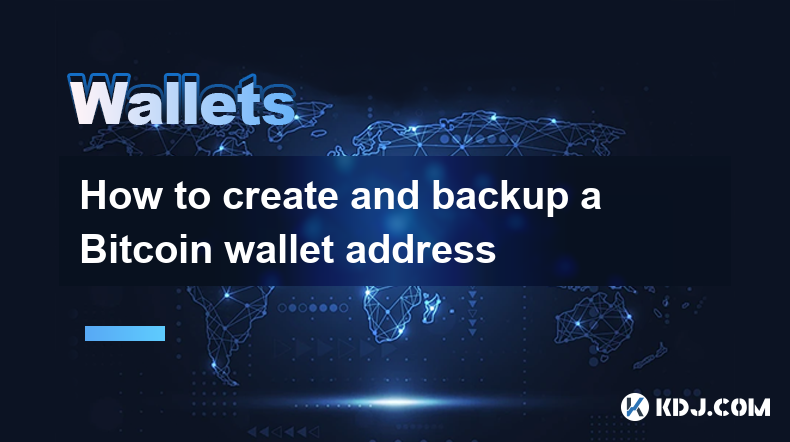
Understanding Bitcoin Wallet Addresses
A Bitcoin wallet doesn't actually store your Bitcoins. Instead, it stores your private keys, which are cryptographic codes that prove your ownership of specific Bitcoin addresses. These addresses are like your bank account numbers – public identifiers where you can receive Bitcoin. It's crucial to understand the distinction between your private keys (which must be kept secret) and your public addresses (which can be shared freely). Losing your private keys means losing access to your Bitcoins.
Choosing a Wallet Type
Several types of Bitcoin wallets cater to different needs and levels of technical expertise. Hardware wallets offer the highest level of security, storing your private keys offline on a dedicated device. Software wallets, available as desktop applications or mobile apps, provide convenient access but require careful security practices. Web wallets, accessed through a browser, are the least secure option, as your keys are held by a third party. Consider your security needs and technical skills when choosing.
Creating a Bitcoin Wallet Address: Hardware Wallet Example
Let's illustrate with a hardware wallet, like Ledger or Trezor. The process varies slightly depending on the specific device.
- Unbox your hardware wallet and connect it to your computer.
- Follow the on-screen instructions to set up your device and create a PIN. This PIN is crucial for accessing your wallet.
- The device will generate a seed phrase – a list of 12-24 words. This seed phrase is your master key. Write it down on paper, store it securely offline, and never share it with anyone.
- Your hardware wallet will then display your Bitcoin addresses. You can use these addresses to receive Bitcoin.
Creating a Bitcoin Wallet Address: Software Wallet Example
Software wallets, like Electrum or Exodus, offer a slightly different approach.
- Download and install the chosen software wallet on your computer or mobile device.
- Follow the on-screen instructions to set up your wallet. This often involves creating a strong password.
- The wallet will generate a new Bitcoin address for you. You'll typically have the option to generate multiple addresses.
- Some software wallets also generate a seed phrase or private key file. Back this up carefully and securely, following the wallet's specific instructions.
Creating a Bitcoin Wallet Address: Web Wallet Example
Web wallets are generally simpler to set up but inherently less secure.
- Create an account with your chosen web wallet provider.
- Follow the provider's instructions to set up your account. This usually involves creating a username and password.
- The web wallet will generate a Bitcoin address for you.
- Remember that your private keys are managed by the web wallet provider. Choose a reputable provider with a strong security record.
Backing Up Your Bitcoin Wallet
Backing up your wallet is paramount to protecting your Bitcoins. The method depends on your wallet type.
- Hardware Wallet: The most critical backup is your seed phrase. Keep it in a safe, offline location.
- Software Wallet: Back up your seed phrase or private key file, depending on the wallet. Consider using multiple backup methods, such as writing it down and storing it in a secure digital location.
- Web Wallet: While you don't directly manage private keys, secure your account credentials. Enable two-factor authentication for enhanced security. Note that recovery options vary widely depending on the provider.
Understanding Private Keys and Security
Your private keys are the most important aspect of your Bitcoin wallet security. Never share your private keys with anyone, and never store them digitally in an insecure location. Compromising your private keys means losing access to your Bitcoins. Choose strong passwords and enable two-factor authentication wherever possible. Regularly update your wallet software to benefit from security patches.
Choosing a Secure Location for Your Backup
Consider using a fireproof and waterproof safe for physical backups of your seed phrases. For digital backups, encrypt the files and store them on multiple secure drives, ideally in different physical locations. Consider using a password manager to securely store your wallet passwords.
Frequently Asked Questions
Q: What is a Bitcoin wallet address?
A: A Bitcoin wallet address is a public identifier, like a bank account number, where you can receive Bitcoin. It's different from your private key, which proves your ownership.
Q: How many Bitcoin wallet addresses can I have?
A: Most wallets allow you to generate multiple Bitcoin addresses. This enhances privacy and security.
Q: What happens if I lose my private key?
A: If you lose your private key, you lose access to the Bitcoins associated with that address. There's no way to recover them.
Q: Is a web wallet safe?
A: Web wallets are generally less secure than hardware or software wallets because your private keys are held by a third party. Choose a reputable provider with strong security measures.
Q: What is a seed phrase?
A: A seed phrase is a list of words that acts as a master key to your wallet. It allows you to recover your wallet if you lose access. Keep it safe and secret.
Q: How often should I back up my wallet?
A: Back up your wallet immediately after creating it, and regularly thereafter. The frequency depends on your risk tolerance, but at least annually is recommended.
Disclaimer:info@kdj.com
The information provided is not trading advice. kdj.com does not assume any responsibility for any investments made based on the information provided in this article. Cryptocurrencies are highly volatile and it is highly recommended that you invest with caution after thorough research!
If you believe that the content used on this website infringes your copyright, please contact us immediately (info@kdj.com) and we will delete it promptly.
- Ignore the Bitcoin Crash, These 3 Presale Tokens Are the Best Crypto to Buy the Dip
- 2025-04-03 20:45:12
- Outperforming Cardano (ADA): Dogecoin (DOGE), Stellar (XLM), TRON (TRX), and Rexas Finance (RXS)
- 2025-04-03 20:45:12
- Former Binance CEO Changpeng Zhao (CZ) Rejected an Acclaimed Innovator's Proposal to Collaborate on Tokenizing Assets
- 2025-04-03 20:40:12
- Influenced by the United States' Changing Crypto Regulatory Landscape, Brazil is Considering Issuing Its Own Stablecoin
- 2025-04-03 20:40:12
- PayPal Crypto Has Added Solana and Chainlink for U.S. Customers
- 2025-04-03 20:35:12
- Bitcoin (BTC) is the “safe haven” of future wealth, and cloud mining is the core entrance
- 2025-04-03 20:35:12
Related knowledge

How to perform CoinJoin transactions with Coldcard Mk4?
Apr 03,2025 at 06:15pm
Introduction to CoinJoin and Coldcard Mk4CoinJoin is a privacy-enhancing technique used in the cryptocurrency world, particularly for Bitcoin, to obscure the trail of transactions and enhance user anonymity. By mixing multiple transactions from different users into a single transaction, it becomes difficult to trace the flow of funds. Coldcard Mk4, a hi...
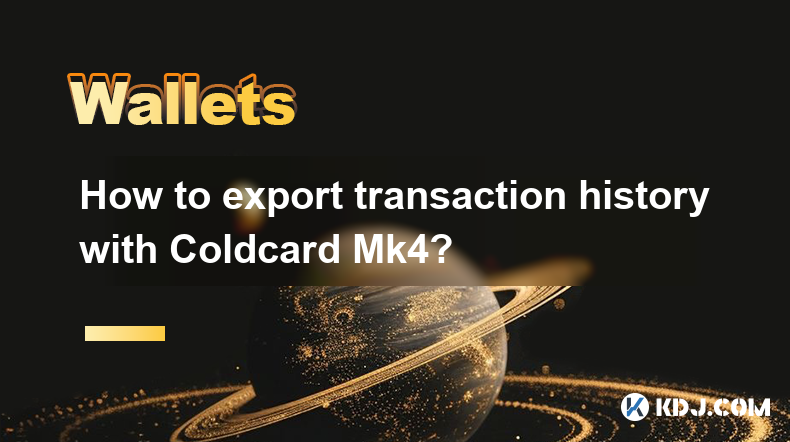
How to export transaction history with Coldcard Mk4?
Apr 03,2025 at 02:56pm
Introduction to Coldcard Mk4The Coldcard Mk4 is a highly secure hardware wallet designed specifically for Bitcoin. It is known for its robust security features, making it an ideal choice for users who prioritize the safety of their cryptocurrency. One of the essential functionalities of any hardware wallet is the ability to manage and export transaction...
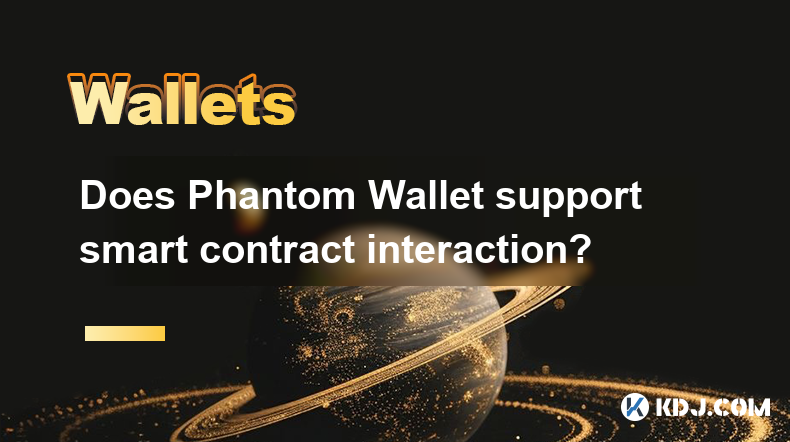
Does Phantom Wallet support smart contract interaction?
Apr 03,2025 at 05:49pm
Does Phantom Wallet Support Smart Contract Interaction?Phantom Wallet, primarily known for its user-friendly interface and robust security features, has become a popular choice among cryptocurrency enthusiasts. A common question among users is whether Phantom Wallet supports smart contract interactions. The answer is yes, Phantom Wallet does support sma...
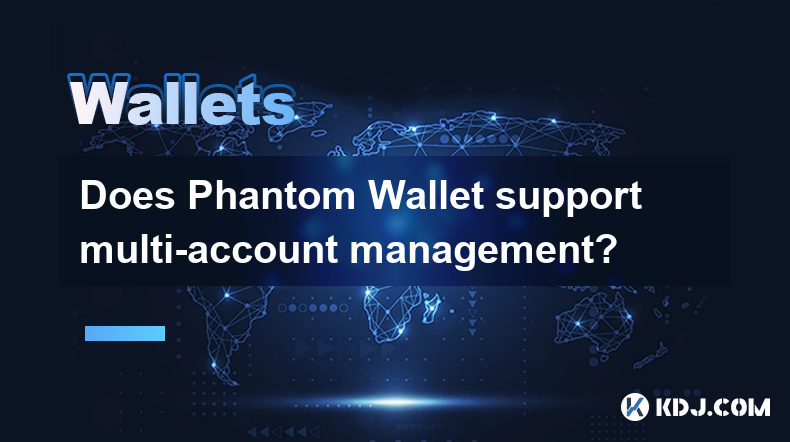
Does Phantom Wallet support multi-account management?
Apr 03,2025 at 02:49pm
Introduction to Phantom WalletPhantom Wallet is a popular cryptocurrency wallet primarily used for managing Solana-based assets. It's known for its user-friendly interface and robust security features. As the crypto space evolves, users are increasingly looking for wallets that can handle multiple accounts seamlessly. This article explores whether Phant...
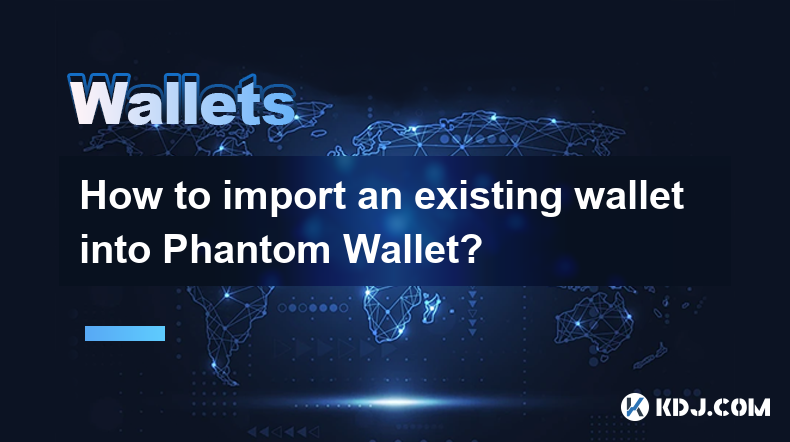
How to import an existing wallet into Phantom Wallet?
Apr 03,2025 at 02:15pm
Importing an existing wallet into Phantom Wallet is a straightforward process that allows users to manage their cryptocurrency assets seamlessly. Phantom Wallet, a popular non-custodial wallet for Solana and other blockchains, supports importing wallets through various methods, including seed phrases and private keys. This guide will walk you through th...
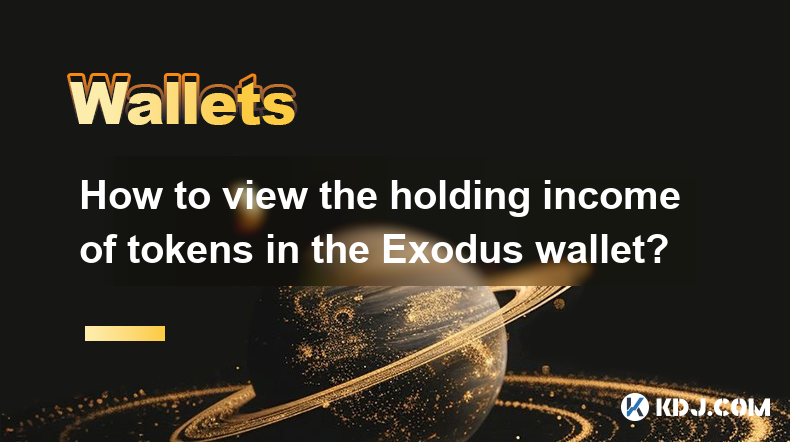
How to view the holding income of tokens in the Exodus wallet?
Apr 03,2025 at 04:28pm
Managing your cryptocurrency portfolio effectively requires a clear understanding of your holding income. If you're using the Exodus wallet, you might be curious about how to view the holding income of your tokens. This article will guide you through the process step-by-step, ensuring you can track your earnings with ease. Understanding Holding Income i...

How to perform CoinJoin transactions with Coldcard Mk4?
Apr 03,2025 at 06:15pm
Introduction to CoinJoin and Coldcard Mk4CoinJoin is a privacy-enhancing technique used in the cryptocurrency world, particularly for Bitcoin, to obscure the trail of transactions and enhance user anonymity. By mixing multiple transactions from different users into a single transaction, it becomes difficult to trace the flow of funds. Coldcard Mk4, a hi...

How to export transaction history with Coldcard Mk4?
Apr 03,2025 at 02:56pm
Introduction to Coldcard Mk4The Coldcard Mk4 is a highly secure hardware wallet designed specifically for Bitcoin. It is known for its robust security features, making it an ideal choice for users who prioritize the safety of their cryptocurrency. One of the essential functionalities of any hardware wallet is the ability to manage and export transaction...

Does Phantom Wallet support smart contract interaction?
Apr 03,2025 at 05:49pm
Does Phantom Wallet Support Smart Contract Interaction?Phantom Wallet, primarily known for its user-friendly interface and robust security features, has become a popular choice among cryptocurrency enthusiasts. A common question among users is whether Phantom Wallet supports smart contract interactions. The answer is yes, Phantom Wallet does support sma...

Does Phantom Wallet support multi-account management?
Apr 03,2025 at 02:49pm
Introduction to Phantom WalletPhantom Wallet is a popular cryptocurrency wallet primarily used for managing Solana-based assets. It's known for its user-friendly interface and robust security features. As the crypto space evolves, users are increasingly looking for wallets that can handle multiple accounts seamlessly. This article explores whether Phant...

How to import an existing wallet into Phantom Wallet?
Apr 03,2025 at 02:15pm
Importing an existing wallet into Phantom Wallet is a straightforward process that allows users to manage their cryptocurrency assets seamlessly. Phantom Wallet, a popular non-custodial wallet for Solana and other blockchains, supports importing wallets through various methods, including seed phrases and private keys. This guide will walk you through th...

How to view the holding income of tokens in the Exodus wallet?
Apr 03,2025 at 04:28pm
Managing your cryptocurrency portfolio effectively requires a clear understanding of your holding income. If you're using the Exodus wallet, you might be curious about how to view the holding income of your tokens. This article will guide you through the process step-by-step, ensuring you can track your earnings with ease. Understanding Holding Income i...
See all articles























































































